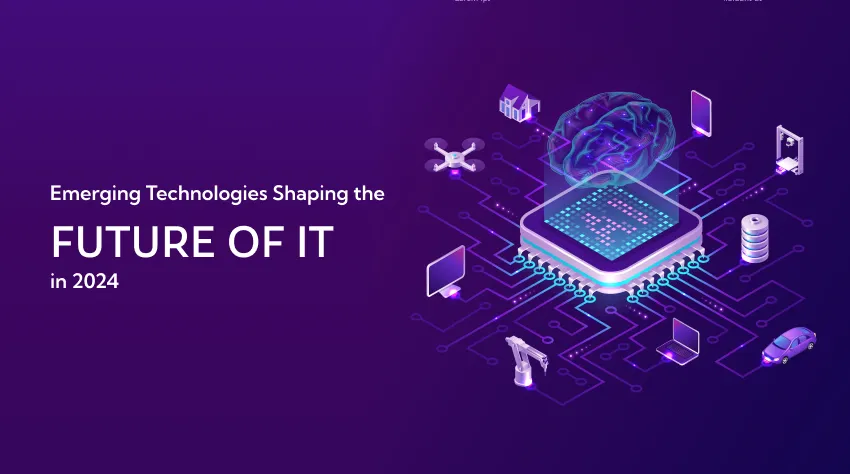
The IT industry is constantly evolving, with innovations reshaping how businesses operate and individuals interact with technology. As we head into 2024, several emerging technologies are making significant strides, revolutionizing sectors from healthcare to finance, education to entertainment. Below are the most transformative IT technologies gaining traction this year.
1. Quantum Computing: Redefining the Future of Processing Power
Quantum computing, which harnesses the principles of quantum mechanics, is set to surpass the limitations of classical computers. Unlike traditional systems that use bits (either 0 or 1), quantum computers use qubits, which can be in multiple states simultaneously. This allows quantum computers to perform complex calculations at unprecedented speeds.
In 2024, companies like IBM, Google, and Microsoft are advancing quantum research. Quantum computing has the potential to revolutionize industries requiring high computational power, such as cryptography, drug discovery, weather forecasting, and financial modeling.
Key Applications:
- Optimizing logistics and supply chains
- Accelerating AI and machine learning models
- Enhancing cybersecurity through quantum encryption
2. AI-Powered Automation: From AI Co-pilots to Autonomous Systems
Artificial intelligence (AI) continues to revolutionize industries through enhanced automation. AI systems are becoming more adaptive and integrated, moving beyond simple task automation to acting as sophisticated decision-makers and problem-solvers.
In 2024, advancements in Generative AI (like OpenAI’s GPT models) allow machines to generate content, code, and even creative outputs. AI-powered tools, such as GitHub Copilot, are transforming software development, while autonomous AI systems are making inroads into healthcare diagnostics, customer service, and even legal practices.
Key Applications:
- AI-driven software development
- Autonomous vehicles and drones
- AI-enhanced healthcare diagnostics
3. Edge Computing: Empowering Real-Time Data Processing
Edge computing is an architecture that brings data processing closer to the source of data generation, such as IoT devices or local servers, instead of relying on centralized cloud-based systems. By 2024, the growing demand for low-latency processing in applications like autonomous vehicles, smart cities, and industrial automation has placed edge computing in the spotlight.
5G connectivity has further accelerated edge adoption, enabling faster data transmission and supporting applications that require real-time processing, like AR/VR and autonomous decision-making systems.
Key Applications:
- Real-time analytics for industrial automation
- Smart city infrastructures
- Enhanced AR/VR experiences
4. Metaverse: A New Dimension of Digital Interaction
The concept of the Metaverse — a collective virtual shared space that blurs the boundaries between digital and physical realities — is gaining significant momentum. Fueled by advancements in virtual reality (VR), augmented reality (AR), blockchain, and digital twins, the metaverse promises immersive digital experiences for work, entertainment, and social interaction.
Companies like Meta (formerly Facebook) and Epic Games are investing heavily in creating immersive environments for gaming, virtual offices, and online events, driving the metaverse toward mainstream adoption in 2024.
Key Applications:
- Virtual collaboration and remote workspaces
- Immersive gaming and social experiences
- Digital economies and NFT-based marketplaces
5. Cybersecurity Innovations: Post-Quantum Cryptography and AI Defense
With increasing cyber threats, 2024 has seen a surge in innovations within the cybersecurity sector. The rise of post-quantum cryptography seeks to safeguard sensitive data from future quantum attacks. Traditional encryption methods may become obsolete as quantum computers advance, making it crucial to develop quantum-resistant algorithms.
Meanwhile, AI-driven cybersecurity solutions are becoming more adept at identifying and responding to threats in real-time, automating threat detection, and predicting cyberattacks before they occur.
Key Applications:
- Post-quantum encryption for future-proofing security
- AI-powered threat detection and response systems
- Zero Trust architectures for enhanced network security
6. Blockchain Beyond Cryptocurrency: Smart Contracts and Decentralization
Blockchain technology continues to evolve, with applications extending far beyond cryptocurrency. In 2024, blockchain is being widely used for smart contracts, which automatically execute agreements when predefined conditions are met, eliminating the need for intermediaries. This is transforming sectors like real estate, legal, supply chain management, and finance.
Additionally, Decentralized Finance (DeFi) platforms are gaining traction, enabling peer-to-peer financial services without traditional intermediaries, reshaping how individuals access loans, insurance, and investments.
Key Applications:
- Decentralized finance platforms (DeFi)
- Transparent and tamper-proof supply chains
- Smart contracts in legal and financial sectors
7. Sustainable IT: Green Technologies and Energy-Efficient Solutions
As climate change becomes a global priority, the IT industry is focusing on sustainability. In 2024, energy-efficient data centers, green cloud computing, and the development of eco-friendly hardware are top priorities. Companies are also using AI to optimize energy consumption, ensuring greener and more sustainable IT infrastructures.
Additionally, blockchain-based solutions are being developed for tracking carbon credits, enabling transparent sustainability reporting.
Key Applications:
- AI-driven energy optimization in data centers
- Sustainable hardware development and recycling
- Blockchain-based carbon credit tracking
8. AI in Healthcare: Precision Medicine and Robotic Surgery
Healthcare is one of the sectors most dramatically transformed by AI advancements. In 2024, precision medicine — which uses AI to tailor treatments to individual patients based on genetic and lifestyle data — is becoming more common. AI also powers robotic surgery, enhancing precision and reducing human error.
Telemedicine, driven by AI-powered diagnostics and remote monitoring tools, is also gaining prominence, ensuring broader healthcare access globally.
Key Applications:
- AI-enhanced robotic surgery
- AI-powered diagnostics and telemedicine
- Precision medicine for tailored treatments
Conclusion
The IT landscape of 2024 is brimming with innovations that are not only pushing the boundaries of what’s possible but also addressing critical global challenges. From quantum computing’s unmatched computational potential to AI’s transformative role in nearly every industry, the future of IT is shaping up to be both exciting and impactful. Staying abreast of these technologies will be crucial for businesses and individuals looking to remain competitive and future-ready.




